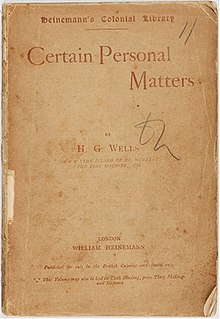 First edition | |
| Author | H. G. Wells |
|---|---|
| Original title | Certain Personal Matters: A Collection of Material, Mainly Autobiographical |
| Language | English |
| Genre | Essays |
| Publisher | William Heinemann |
Publication date | 1897 |
| Publication place | United Kingdom |
Certain Personal Matters is an 1897 collection of essays selected by H. G. Wells from among the many short essays and ephemeral pieces he had written since 1893.[1] The book consists of thirty-nine pieces ranging from about eight hundred[2] to two thousand words[3] in length. A one-shilling reprint (two shillings in cloth) was issued in 1901 by T. Fisher Unwin.
The essays in Certain Personal Matters are written from a consistent first-person perspective, but only one describes an identifiable event in Wells's life—how he responded to being diagnosed with tuberculosis in the fall of 1887.[4]
The other essays adopt the playful persona of an aspiring young writer living in modest circumstances with a wife, Euphemia, who is only sketchily and obliquely described. Their tone reflects the demands of the market in London magazines for "short essays, or short stories, often with a twist, which can be read in half a dozen minutes, but which will pique a reader's attention and ultimately allow him to think, 'How true. I have done that myself', or to make some similar remark."[5]
More than half of the essays are humorous social satire; serious subjects are addressed only ironically. Politics, historical and economic topics, and identifiable portraiture are eschewed. Ten essays have literary themes, and in these, too, the point of view is humorous. One ("On Schooling and the Phases of Mr. Sandsome") gently critiques the choice of subjects studied in the course of primary and secondary education. Half a dozen essays engage scientific themes, especially natural selection and evolution, and in "The Extinction of Man" Wells shows he is contemplating themes that would be expressed in his next novel, The War of the Worlds: "Even now, for all we can tell, the coming terror may be crouching for its spring and the fall of humanity may be at hand."
- ^ David C. Smith, H.G. Wells: Desperately Mortal: A Biography (New Haven and London: Yale University Press, 1986), pp. 35-37. "Most of Wells's ephemeral pieces have not been collected, and many have not even been identified as his. Wells did not automatically receive the byline his reputation demanded until after 1896 or so. Some journals had a policy of giving only one byline an issue, no matter how many pieces an author contributed to it. Wells also occasionally used pseudonyms, although these are ordinarily very easy to spot. His style became increasingly recognizable, and eventually he collected a number of these magazine pieces in two early volumes [Select Conversations with an Uncle and Certain Personal Matters] . . . As a result, many of his early pieces are known. Some knowledge also comes from a list compiled by Jane Wells [i.e. Catherine Robbins Wells, Wells's second wife] in the First World War period. But it obvious that many early Wells items have been lost. . . . Of course, Wells himself may have been unwilling to have some of his early published work reprinted, although the correspondence does not suggest that he was ashamed of much that he wrote" (p. 35).
- ^ "How I Died," the last piece in the collection, written in 1897.
- ^ "Of a Book Unwritten," a speculation about the future evolution of Homo sapiens.
- ^ "How I Died," the volume's concluding piece. The diagnosis of a fatal illness, which came about a month after Wells incurred a serious internal injury while playing rugby on Aug. 30, 1887, proved to be mistaken. Wells describes three phases of his reaction. "My first phase was an immense sorrow for myself. . . . Then presently the sorrow broadened . . . I thought more of the world's loss, and less of my own. . . . This lasted . . . nearly four months," until one day on a springtime walk "I quite forgot I was a Doomed Man. . . . For a moment I tried in vain to think what it was had slipped my memory. Then it came, colourless and remote. 'Oh! Death.... He's a Bore,' I said; 'I've done with him,' and laughed to think of having done with him. 'And why not so?' said I." (These are the concluding words of Certain Personal Matters.)
- ^ David C. Smith, H.G. Wells: Desperately Mortal: A Biography (New Haven and London: Yale University Press, 1986), p. 35.